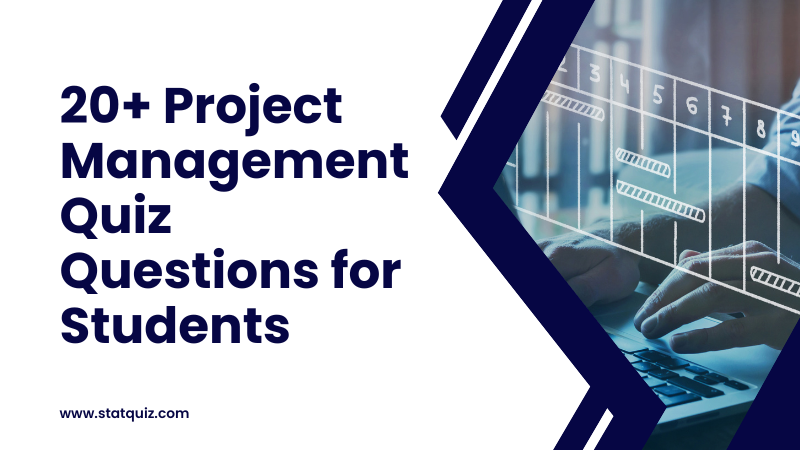Project management is an essential skill in today’s society. As project management becomes increasingly important in our lives, so too have the number of resources available to us to help us learn, teach and test what we have learned. Here are 20+ Project Management Quiz Questions for Students .
So, let’s get started with some project management quiz questions and their answers for students.
Q1. Project partnerships offer all of the following advantages to vendors EXCEPT:
a. More dependable stream of work
b. Greater potential profit
c. Clearly stated expected outcome
d. Buyer gains at the vendor’s expense
Q2. All of the following statements accurately describe supply chain management EXCEPT:
a. It addresses the flow of material, service, monetary and information across supply chain partners.
b. It spans across suppliers and producers, resellers, project organizations and consumers.
c. It is a closed-loop system solely within the project organization’s boundaries.
d. It is a system’s approach to managing the entire flow of physical products.
Q3. Often a project team will start the selection process by establishing a list of potential suppliers. All of the following information sources are frequently used to identify these potential suppliers EXCEPT:
a. trade shows
b. stakeholder register
c. sales personnel
d. supplier catalogs or websites
Q4. All of these are factors that could lead to a decision to buy or outsource rather than make or perform in-house, EXCEPT:
a. Ability to utilize specialized suppliers
b. Flexibility in procurement
c. More control over quality and time
d. Inadequate capacity
Q5. The procurement management plan:
a. describes how sellers will be audited by the procurement team.
b. describes how supply chain partners will be managed.
c. describes how the procurement division will be managed.
d. describes how a project team will acquire goods and services from outside the performing organization.
Q6. Evaluations of prospective suppliers by project teams often involve all of the following approaches EXCEPT:
a. financial condition analysis
b. supplier surveys
c. prototyping
d. facility visits
Q7. All of the following entities are typically included in the supply chain EXCEPT:
a. project team
b. public relations
c. consumers
d. suppliers
Q8. Which of the following factors should be considered in a make-or-buy decision?
a. project manager’s or sponsor’s preference
b. project manager’s or sponsor’s preference
c. only the direct costs associated with the decision, excluding consideration of indirect costs
d. advantages and disadvantages of outsourcing in terms of time, cost and performance control
Q9. Which of the following is one of the PMBOK Guide’s three project procurement management processes?
a. Conduct procurements
b. Manage logistics
c. Conduct Make-or-Buy Analysis
d. Plan supply chain management
Q10. Under normal conditions, which of these contract types poses the greatest risk to the buyer?
a. Fixed-Price-Incentive-Firm (FPIF)
b. Cost-Plus-Fixed-Fee (CPFF)
c. Time and Material (T&M)
d. Firm-Fixed-Price (FFP)
Q11. Supply chain operations require managerial processes that span across functional areas within individual organizations, and link trading partners and customers across organizational boundaries.
a. True
b. False
Q12. During procurement planning, the project team determines which needs can best be met by acquiring products and services from an outside provider, and which can be accomplished by the team.
a. True
b. False
Q13. One of the important factors that should influence the selection of contract type is how the risk is distributed between the buyer and the seller, and how the project is performed.
a. True
b. False
Q14. Traditional project procurement was characterized by win / lose adversarial relations between owner and contractor, whereas contemporary project partnering fosters a relationship of trust and collaboration.
a. True
b. False
Q15. Among the disadvantages associated with outsourcing is the gradual loss of special skills for doing some specific activities that have been outsourced.
a. True
b. False
Q16. Project partnerships can be advantageous to both the client and the vendor, in terms of improved project execution, flexibility, and reduced bid administration.
a. True
b. False
Q17. Supply chains use a combination of modes of transportation including: air, rail, water, pipeline and truck.
a. True
b. False
Q18. On complex projects, despite the importance of factors such as technical capability, managerial capability and previous experience; the selection decision is made mostly or entirely on price.
a. True
b. False
Q19. The evaluation criteria that were developed during procurement planning to define how the team will evaluate and rank proposals should guide them in the vendor evaluation and selection process.
a. True
b. False
Q20. Information is a key ingredient at each stage of the project supply chain, as well as within each phase of supply chain decision making.
a. True
b. False
Answers
- d
- c
- b
- c
- d
- c
- b
- d
- a
- b
- a
- a
- a
- a
- a
- a
- a
- b
- a
- a

